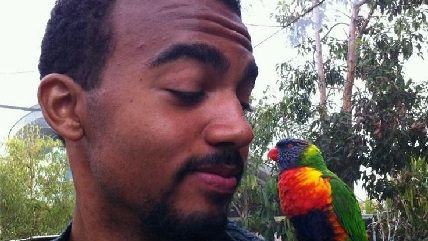Interview: Reed College Provocateur Explains Why He Demanded I Use the N-Word
The line between microaggression and actual aggression.


Late last week, I reported on the strange case of Jeremiah True, a Reed College student kicked out of his humanities class for allegedly denying rape culture and disputing certain sexual assault statistics. While BuzzFeed provided some evidence that True's views were the problem—and had "triggered" students who were themselves of victims of sexual assault—I grew suspicious after contacting True myself. He declined to answer any of my questions unless I agreed to write the n-word as the first word in my article about him. (I rejected this demand.)
Reached by phone on Tuesday afternoon, True explained why he made that request.
"Basically, I was interested in experimenting with how much research the media would actually do," True told me. "Because most people just went off of the BuzzFeed article, but the BuzzFeed article linked to my petition, which was filled with a lot more information than the BuzzFeed article was necessarily able to impart. So I basically just asked you to print that word because I wanted to see if you were willing to report on my story or if you were committed to maintaining your readership."
Vigorous use of the n-word has become a staple of True's interactions with other students and online postings. In a recent interview with Charles Johnson, he admitted to "nonviolently protesting and disrupting some events on campus, and just walking through the halls and calling people nigger. Because if they are actually going to accuse me of being sexist and racist, then I might as well act as an actual sexist or racist might. To date, I believe I've gotten 22 no-contact orders."
As I told True, this concession that he was deliberately disruptive undermines the notion that he was told not to return to class merely because he expressed controversial views. Students should be free to sound off on touchy subjects, but they can't cause such a disturbance that it's impossible for professors to even teach their classes. Students who talk out of turn, yell at each other, or derail the conversation are hurting the discussion in the same way that censorship and trigger warnings do.
But True maintains that he did not escalate his behavior to the point of deliberate provocation until after he had already been disciplined. His in-class antics were respectful, he said.
"I would say that I was not disruptive in any way," he said. "I essentially questioned a statistic and I was thrown out of class because people were uncomfortable. I didn't do it in an aggressive manner."
According to The Daily Beast, True has refused to attend any of his classes until professor Pancho Savery lets him return to humanities. He is currently confined to his dorm (by mutual agreement with the college), reading and writing increasingly offensive online posts. Here is one, from The Beast:
"I am the God of MRA's [men's rights activists], Antifeminists, AntiMarxists, Libertarians, and White, heternormative men and women everywhere," wrote True in a different part of the 16-page essay posted on his Facebook page, "I am a misogynist and a misandrist, a racist, and a feminist. And now I'm here to call you out on your bullshit, Reed. I made my entire college run for cover because I'm an actual activist. I yelled "n**ger" in public places and nonviolently disrupted a forum on student activism when I felt my rights weren't respected. Now that'sactivism… Gender feminists. I am a biracial, bisexual, non-gender conforming Black n**ger. Suck. My. Enormous. Black. Dick."
True is quick to explain that much of this is provocation for provocation's sake. He wants to teach people that there is a difference between uncomfortable language and actual violence, for one thing.
"Language, in and of itself, cannot be violent," he told me. "A threat of violence is definitely violent. I just want [students] to understand the difference between me saying the n-word, and me saying, for example, 'I am going to kill you.' That is not okay. But me simply expressing that word is not in and of itself violent, and nothing I did could be construed as violent."
He's right, of course. There are differences between microaggressions, disruptive aggression, and physical aggression. Clearly, he hasn't waded into that third, unacceptable category. And it's also clear that some of his classmates were offended by his views, which raises the possibility that True was punished in part because he dared to say something offensive.
But the way I see it, True will have a hard time arguing that he never did anything that would give a professor a legitimate reason to discipline him, since his self-proclaimed mission is now to cause as much trouble as possible. Put another way, there's a place for disruptive ideas in the college classroom. I don't know for sure whether there is a place for a student like True, however.
That may be just fine with him, though. After he gets even with Reed, he plans to leave the college and launch a media or political career.
"I think I have some… pretty healthy ideas about better ways for the country to be run, and want those ideas to be shared," he told me. "I don't think I necessarily have to wait to finish college to do that."


Show Comments (248)